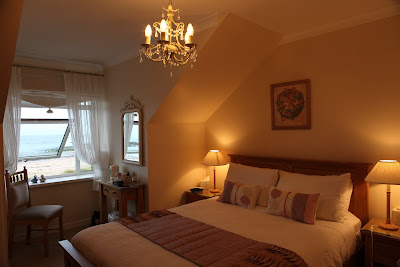So Stonehaven, for me, was one of these. It's a seemingly straightforward, pretty coastal town on the east coast of Scotland. A small beach, sleepy main street, laid-back locals, some innocuously pleasant scenery. You drive into it, and say to yourself: "Nice", rather than "Cool!". But it's got a couple of more-than-nice surprises.

Dunnotar Castle, scene of Braveheart's "incineration" of the English in 1297, and now a somewhat more pleasant scene...click on the image for a full screen version.
First up, Dunnotar Castle, about two miles to the south of the town's centre. Perched on a cliffed-promontory about 50 metres into the North Sea, the ruins are joined to the mainland by a low-flung stone causeway. There hasn't always been a castle on top, but it's been an important site of defence since 681 AD. And since then, it's had a history worthy of an action-packed film.

Dunnotar Castle, scene of Braveheart's "incineration" of the English in 1297, and now a somewhat more pleasant scene...click on the image for a full screen version.
Given its formidable natural setting, it would be very difficult to attack the castle. Well, except for William Wallace, the highland warrior leader who was celebrated in the film Braveheart by Mel Gibson. In 1297, he captured the castle from the English, whom we know - from the film - he hated intensely. And he did indeed, because once Willy's men had rounded up the English in the castle's church, he incinerated them by burning down the wooden enclosure in which he had imprisoned them. (By the way, Mel Gibson ended up shooting some of the scenes of the movie Hamlet at Dunnotar in 1990.)
In 1651, Oliver Cromwell's republican forces laid seige to the castle, to try and steal the Scottish Crown Jewels, but a priest's wife smuggled them out, and for some time they were hid in a small church to the south of Stonehaven.
It's open all year round, and - surprise! - it doesn't cost anything to visit. It's the first time on my trip that I've been able to visit a site of such historical importance, and not have to pay. And for me, at least, it's the most dramatic I've seen. So you must visit it.
We go now from the sublimbe to the mildly boring (at least in terms of any more potential Mel Gibson action flicks!). Stonehaven was the birthplace of Robert William Thomson, the inventor of the pneumatic tyre (and fountain pen!). So if it wasn't for Stonehaven, we'd all still be using horses to get around, and carving words into stone. Even a dramatic castle can't compete with RW Thomson.
Then, make a note of Carron Restaurant. It's an art-deco restaurant, situated on the town's little river, and is owned and run by the Cleavers. Robert is the chef and wife Jackie is the manager. They served me plenty of smoked salmon, even though it wasn't on the menu, and the mains of seatrout was fresh. They were friendly too, and just pleased to serve me a good meal. If you've got kids, and the restaurant is a bit quiet, Robert will take your kids into the kitchen, and let them put their own toppings onto their pizzas!
In fact, everyone I bumped into in Stonehaven was friendly. Especially Liz Molloy at The Beach View B&B, where I stayed. When I arrived earlier than expected, she was playing at Edzell Golf Course (which, interestingly, has a "bunker" on the 1st hole which was created by a German bomb, dropped during Second World War - and now called "Hitler's Bunker"!) She rushed back to set me up in the main room that looks over Stonehaven's beach. I slept with the window open all night, and the seawater flowed into my ears all night - audibly that is.
The Beach View only has two rooms, so you feel like it's your own holiday home. Liz is laid-back but attentive, and there are nice touches like binoculars in the rooms to see the birdlife - and occasionaly dolphins! - on the beach right in front of her property.
And then there's Jenna at the tourism information centre on Allardice street. She's generally fantastic. After talking to her, you'll feel like she's reason enough to visit Stonehaven.
A few other things that will keep you in Stonehaven for more than two nights:
- The Stonehaven Golf course runs along the coast, and is accordingly very scenic
- Visiting Cowie Shore to the north of town...only because it was there that the world's-oldest fossil of any air-breathing creature was found! (For the record, it's called Pneumodesmus Newmani.)
- Just south of town is a War Memorial, which is partly unfinished and ruined - intentionally so - to represent the unfinished and ruined lives of those men of Stonehaven killed during the world wars.




